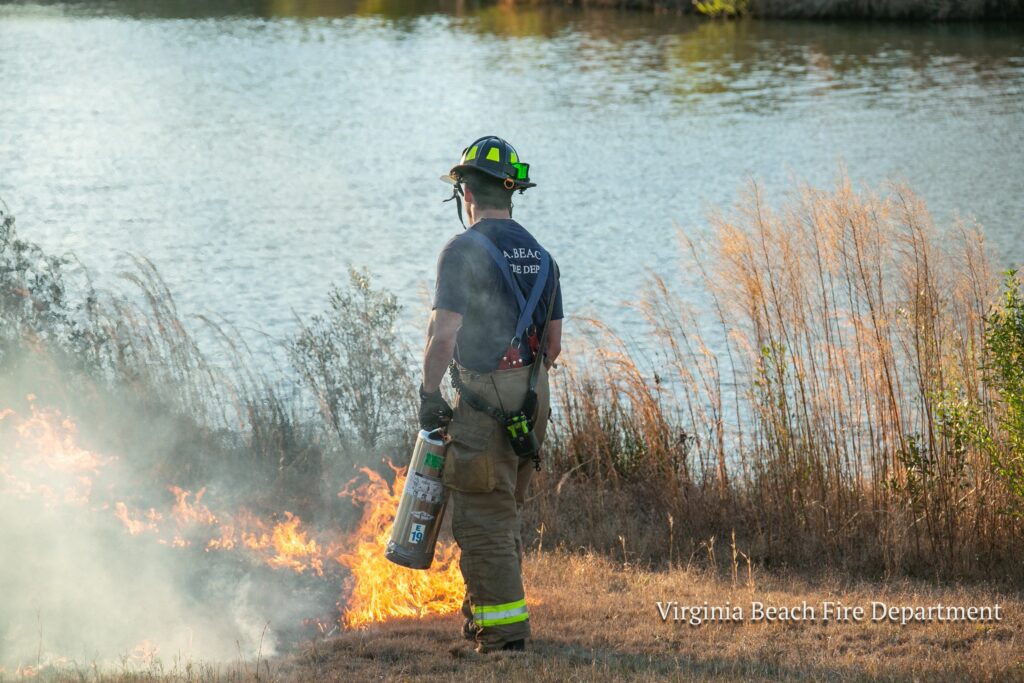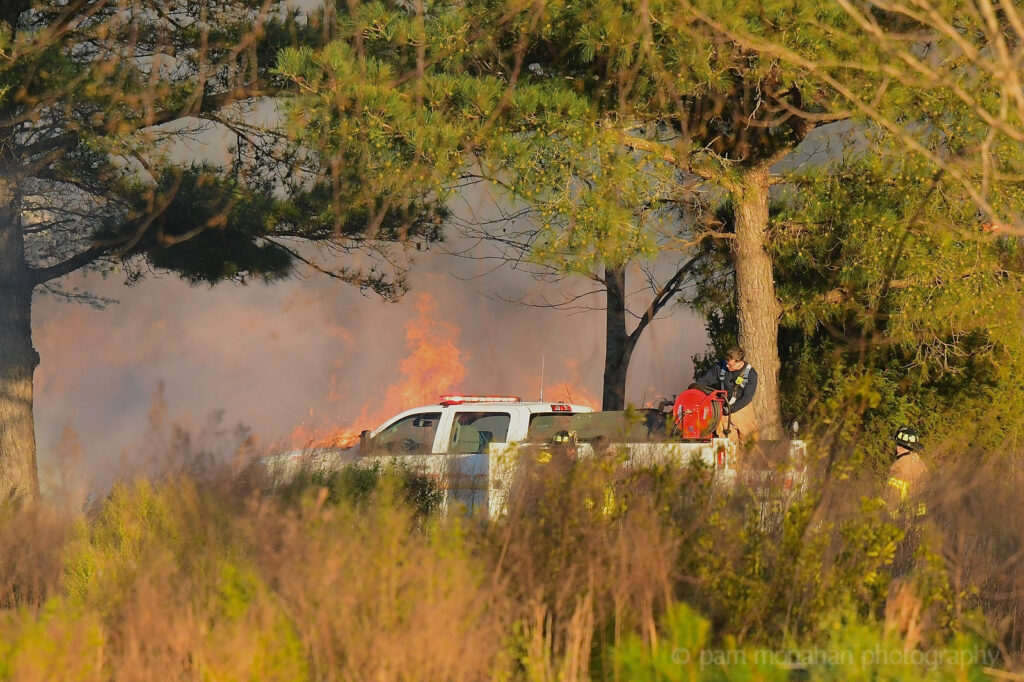
BY DENNIS HARTIG
WEST NECK — At 6:25 a.m. on Tuesday, March 7, the National Weather Service issued a special weather statement for Virginia Beach: “Increased Fire Danger This Afternoon and Evening …” Forecasted 30 mph wind gusts, it cautioned, could turn an errant cigarette or machinery spark into a fire starter. “Any dry grasses and tree litter that ignite will have the potential to spread quickly,” it said.
At 4:08 p.m., according to the Virginia Beach Fire Department, someone in the 2600 block of Majesty Lane in the Villages at West Neck reported seeing smoke rising from a failed golf course in the middle of the neighborhood. The first of 28 rescue units arrived eight minutes later.
Mark and Judy Gellasch watched the fire from across the street of their Gallahad Drive home. As the wind carried the smoke and flames in their direction, Judy Gellasch went back to their house and gathered up their important papers, including her husband’s Coast Guard service paperwork proving his eligibility for pension and medical benefits.
Driven by high winds, the fire snaked and scorched its way across 36 acres. By nightfall, firefighters had chased down all of the spot fires. Aerial photos show the flames made their last stand behind Indian River Plantation homes along Nestlebrook Trail. No one was hurt and the flames never reached a home, but a fire department report provided to The Independent News on Wednesday, March 29, said fire singed the grass and shrubs at 10 yards on Wilderness Lane and Nestlebrook Trail.
“Without fire department intervention,” the report said, “these homes would have had direct flame impingement as a matter of course of the fire.”
What the victory over the fires could not extinguish was a new worry, one that could not have been imagined just hours before. The consensus is that the brush fires could have been much worse, and there is nothing to prevent one from happening again. Neighborhood leaders warned in a letter to homeowners of a “catastrophe” in the waiting. Of Mayor Bobby Dyer and the Virginia Beach City Council, West Neck and Indian River Plantation association presidents in a joint letter asked for “action to be taken immediately” to remove the acres of underbrush still left.
“I wasn’t that sensitive to the threat until the field fire came along,” said Jeffrey Peters, who lives in Arthur Parke Village behind Hole No. 2 on the former course.
Peters spotted the smoke before the firemen arrived. He watched the wind blow the flames away from his house, a relief that gave him little comfort. Now Peters looks at the pines and overgrown vegetation behind his home as menacing kindling.
“Before the fire,” he said, “it was just a visual nuisance.”
Like others, Peters is unhappy about the “double standard” imposed on the community’s 936 homeowners. Peters cannot let the landscaping around his home get out of control. However, a patch of the golf course behind his home can grow as wild as nature will permit.
“I don’t understand how the city says it can’t do anything to make the owner keep up his property,” Peters said.
In 2021, the city tried to enforce a section of city code that sets minimum standards for neighborhood property maintenance. Inspectors issued summons for grass and vegetation taller than 10 inches on the golf course generally, and specifically along Legendary and Arnold Palmer drives.
The owner, then W.C. Capital, LLC, fought back. In a lawsuit, it argued that the code section applied to lawns in neighborhoods. Its property was agricultural “open space” where vegetation can be taller and more natural. Fearing a judge would rule against it, the city did not push for a verdict on what zoning applied. Instead, the city agreed to a compromise, obliging the owner to regularly cut and maintain areas visible from the street and the fairways.
But, the city made a concession that has become the source of friction — and, as the homeowners view it, the biggest threat to safety. The ground between the homes and the fairways — roughs or “buffers” in the settlement — are not required to be cut. Witnesses told The Independent News they saw firefighters douse embers that had ignited in some of them.
The settlement ended a common safety practice. Some homeowners cut these buffers. In the settlement, the property owner warned homeowners they would be prosecuted for trespassing. The buffers have become overgrown.
This is a no-win situation, homeowners say: the city can’t force the owner to cut the buffers, and the homeowners risk trespassing charges if they do.
Everyone now realizes that something has to give, according to Thomas G. Luckman, a member of the West Neck Community Association board.
“The fire changed everything,” he said.

© 2023 Pungo Publishing Co., LLC


The City settled, why would the city of Virginia Beach settle from a company from Florida? Why?
Recall the City Council People for not protecting its citizen from carpetbaggers.